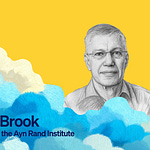Education is often hailed as the engine of prosperity, with many politicians, teachers, and economists insisting that more schooling means more growth. But what if that story is wrong?
In this episode of The Human Progress Podcast, the economist Bryan Caplan joins Marian Tupy to challenge that conventional wisdom. They discuss the impact of education on economic growth, whether school is more about learning or signaling, and what all that means for the future of innovation.
Below is an edited and abridged transcript featuring some highlights from the interview.
I want to start with a broad question. What is economic growth, and where does it come from?
Economic growth is just change in economic well-being. Usually, we measure it with GDP.
Where does it come from? There are a lot of stories that people tell. Traditionally, people said it comes from capital accumulation and better-quality labor. But when you really go to the numbers, neither of these things can explain anywhere close to the full change, so most growth has got to be from technological progress, broadly defined. That is the main difference between the world of today and the world of 2000 years ago.
In your piece, you distill it to a single word: ideas.
That’s right.
Why is economic growth important?
In any given year, it seems like getting another percentage point of growth couldn’t make much difference. You barely even notice it. And yet, as many people have pointed out, when you compound an extra percentage point of growth per year over the course of 100 years, it’s the difference between poverty and riches. And riches are what allow you to buy free time. Riches are what allow you to buy culture, to save your child from worms.
Right. So economic growth is an increase in wealth, it comes from new ideas, and ultimately, it is highly correlated with things like better infrastructure, better hospitals, and so on.
Absolutely.
What is the purported relationship between education and growth?
The normal view is that education is the crucial determinant of growth, that it turns unskilled humans into the skilled workers of the modern economy. This is an idea not just from politicians, teachers, and the general public, but also from economics. If you take a class in economics, they will constantly talk about how it’s important to have lots of education because that’s how we build human capital.
So, the purported relationship is that education creates human capital, which creates new ideas and thus more growth?
That’s one version. The more common one is simply that education leads to human capital, which immediately leads to growth. The typical college grad isn’t going to invent anything, but they’re capable of being a more valuable cog in the machine.
Right, so the standard inference is that if you have a more educated workforce, they can accomplish more sophisticated tasks. What does the evidence show?
So, I have a book called The Case Against Education, and I’m not going to be coy about this: I expected to find that education was overrated. However, I also expected to find that a lot of other people researching would say they had clear evidence that education raises economic growth.
However, when I read all the mainstream work on education, there was a big debate about “how come we’re not finding what we know to be true, which is that education is the crucial cause of economic growth?” I think that they are finding the truth, which is that education isn’t a factory for building human capital, but a certification machine for stamping people: good worker, great worker, not so great worker. People like to think about education as a way of building skills, but actually, it’s more like a passport to the real training, which happens on the job.
So, by going to university, you are offering your employer a sign that you are intelligent and conscientious enough to do so.
You’re showing intelligence, conscientiousness, and also conformity. There’s no “I” in team. Most jobs require you to follow a chain of command to achieve the goal of the group. While on some level I don’t like conformity, on a deeper level it’s really important for most purposes.
I want to read you something that you wrote. “Contrary to conventional stories about the positive externalities of education, mainstream estimates of education’s national rate of return were consistently below estimates of education’s individual rate of return.”
What does that mean?
Great question.
A rate of return is basically a measure of how good an investment is. So, for example, you might try to calculate the rate of return of putting extra insulation on a house. We can do the same for education and figure out how all the costs of education compare to the payoffs.
When you do this from the point of view of an individual person, it’s pretty common to get a 10 percent inflation-adjusted rate of return. In my book, I say this is probably too high, but you can bring it down to maybe 7 or 8 percent.
We can also think about this at the level of the country. What if we raise the education level of the whole workforce of a country by a year? How much does that enrich the country? What that quote is saying is that even the high estimates of how much a year of education does for a country are typically around half of what it does for an individual. And a lot of the estimates find that sending the whole country to school for an extra year increases national income by 1 or 2 percent.
In other words, a stamp is a good way for one person to get ahead in life, but stamping the whole country does not help that country get ahead; it just creates credential inflation. You need more and more degrees in order to get the same job that your parents and grandparents got with fewer.
Let’s talk a little bit about innovation. Where do new ideas come from? Are we talking about a very small group of individuals who share certain characteristics?
It’s an exaggeration to say that innovation only comes from a few people. There are millions of small-scale improvements coming from many different people. Opening a new kind of restaurant is not revolutionary R&D, but so much of the improvement in our living standards comes from these small acts of entrepreneurship. When I was in high school, there were only three kinds of restaurants: American, Italian, and Chinese. Now we have a cornucopia of different cuisines. The same goes for so many other simple products. Dog collars now come in 100 more varieties than they did back when I was growing up in the ’80s.
However, the really revolutionary stuff—new vaccines, new business models, new forms of energy—comes from very special people. I think it’s reasonable to say that almost all the really big ideas are coming out of the top sliver of the IQ distribution. There was a psychologist named Lewis Terman in California who, I believe, in the 1920s, saw that there was a standardized test administered to all the kids in the state of California school system. He managed to get data on the top hundred scorers in the whole state of California in that year, and he followed them through life. In his honor, these kids are named the termites, and there’s been a lot of research on them.
While the vast majority of this group didn’t do anything really impressive, they had many times, maybe a thousand times, the normal rate of stellar success. So, just doing these kinds of tests is a good way of identifying the most promising people. At a minimum, just have a system where you basically let children advance as rapidly as they’re capable of. A lot of very intelligent people feel very isolated from their own age group, and it makes sense just to advance them as far as their talent will take them.
I have a personal view, which is that our society is very open to the idea of the STEM prodigy, but we are very closed to the idea of there being a prodigy in, say, history. And I think that there are history prodigies. I have met kids with not just a broad, but a deep understanding of history by the time they’re 13 or 14. People think it’s crazy to put them in a PhD program in history when they’re 14 years old, but I don’t. Why not skip that kid ahead and let him become a star? Look, maybe he wants to be a regular 12-year-old even though he is a genius, but maybe he doesn’t. Maybe he wants to be with a peer group of geniuses. Let’s pave the way for him if that’s what he wants.
Do you think that AI will allow us to continue innovating if the population starts declining?
There was a long period where people working on AI kept over-promising and under-delivering. I would personally hear extravagant claims and check them out and find that they weren’t true. Finally, about two years ago, they started being correct. I was as shocked as anyone. I actually have a bet out about AI, which I’m probably going to lose. It’s embarrassing because I have otherwise a perfect public betting record.
That said, one incredible achievement does not mean that they’re going to have a whole series of incredible achievements. And there’s a lot to the idea that AI is basically just amazing at compiling what has already been said rather than truly coming up with new stuff. While it’s not impossible for it to get better, a lot better, it’s also not guaranteed.
Another thing worth pointing out is that we’ve had, by many measures, falling rates of innovation despite a rising population. There’s an idea that we’ve already discovered a lot of the low-hanging fruit, and so we need to keep multiplying our efforts to maintain the same rate of growth. Another plausible story is that we have doubled the number of people that we call researchers, but really only the best ones count, and the other ones are kind of fake.
Given that much of the money we spend on education is spent poorly or even counter-productively, what should we do with the money instead?
I’m totally on board with giving it back to the taxpayers or just paying down the national debt. We badly need austerity. We are driving at 100 miles per hour towards a brick wall, but there’s still time to change course and get our foot on the brakes. One of the easiest ways of doing that is by spending less on education.
Is education more useful in the developing world?
Poor countries have a severe problem with teachers even showing up. They, on paper, have many years of education—I think Haiti now is around where France was in 1960—but mostly they are just throwing money at a corrupt system that doesn’t even teach basic literacy and numeracy. The way that people in the third world are learning to use technology is the way that almost all normal people learn anything, which is by doing.
It seems to me that we are doing the exact opposite. We are keeping people in the education system for many years, which could prevent them from starting to work and learning by doing.
Yeah. It would be much better if people started adult life at an earlier age. They’re totally ready for it. There’s no reason why 13- or 14-year-olds should not be working. One of the best ways to get kids to actually learn stuff, especially the kids who hate school, is to make it practical. They need to see concrete results and make money.
If you read biographies or autobiographies of people in earlier eras, it is amazing how far people got at young ages. By the age of 15, Malcolm X had worked four different jobs and been all over the country. Many people listen to me and say, “Oh, that’s so dystopian.” I think the system we have now is dystopian, where someone has to sit in a classroom until they’re 30 listening to some boring windbag talk about things he doesn’t even know how to do.











